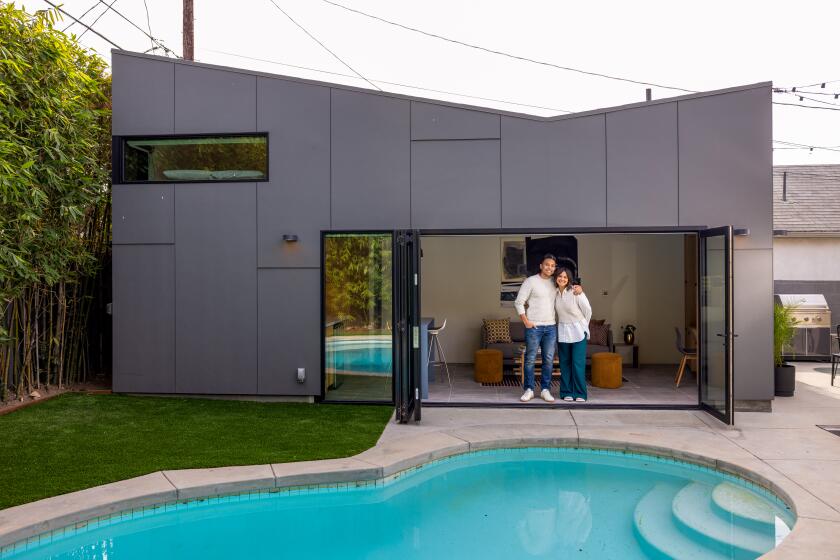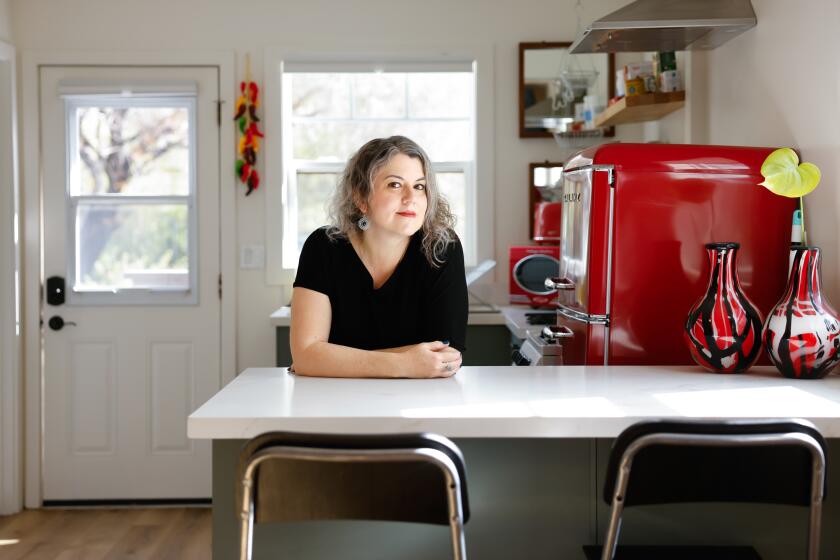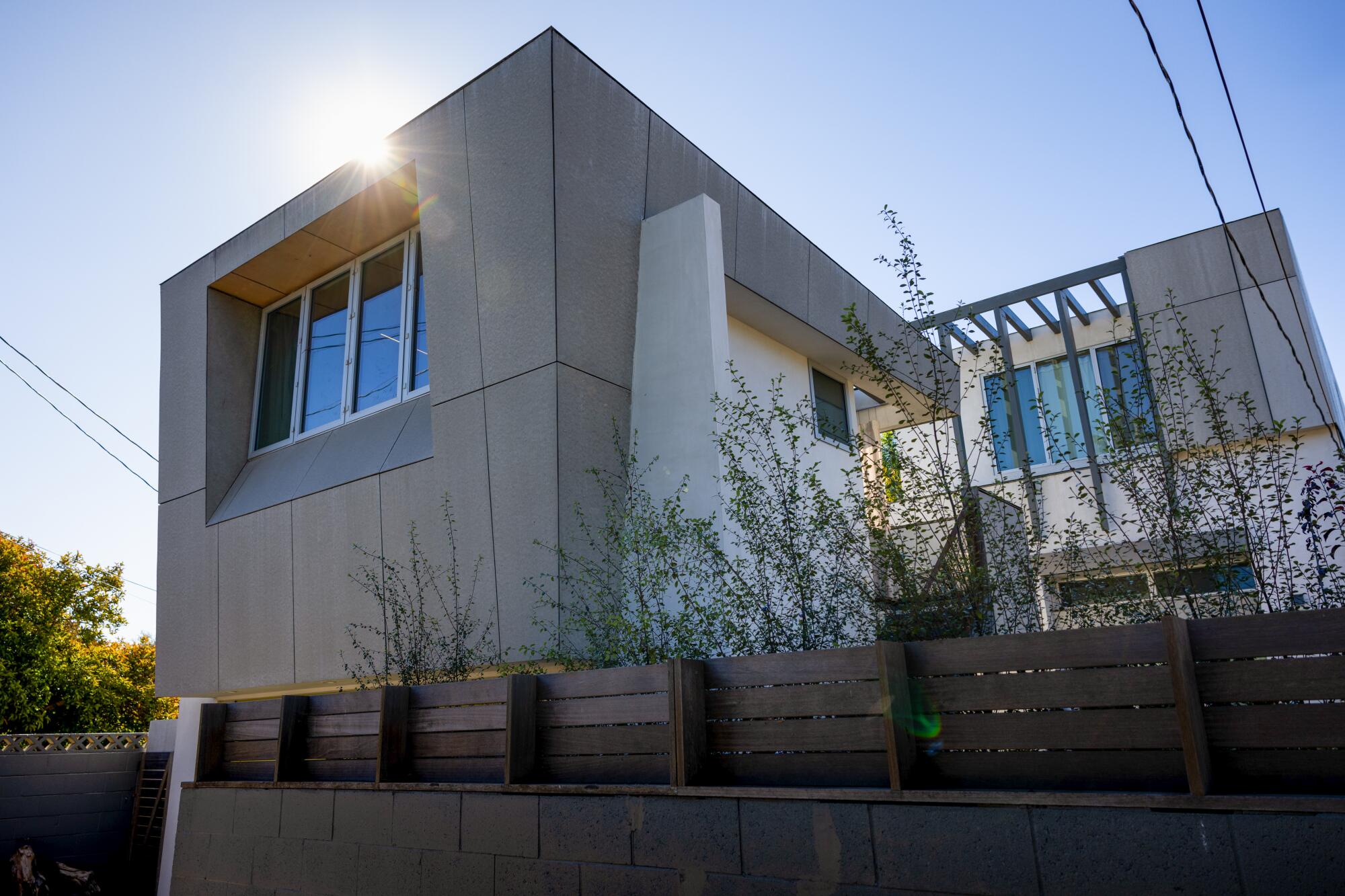
- Share via
The ADU above the garage has all the elements you would expect from a pair of architects: arresting geometry on a narrow lot, a spare kitchenette graced with inventive storage, soaring ceilings and strategically placed aluminum windows to ensure privacy. It’s all well thought out, and it’s in the architects Jefferson Schierbeek and Su Addison’s backyard.
The couple purchased their 1962 Mar Vista home in 1999 for $360,000 when their two children, now 26 and 29, were young. As married partners of the Los Angeles-based firm Addison Schierbeek Architects, they had always wanted to add on to their home as a financial investment and a way to give the house a “bit more breathing room,” Addison says. But like many working parents, the couple put their redesign on the back burner. In the meantime, they parented their children, helped start a charter school and worked on residential projects for their clients.
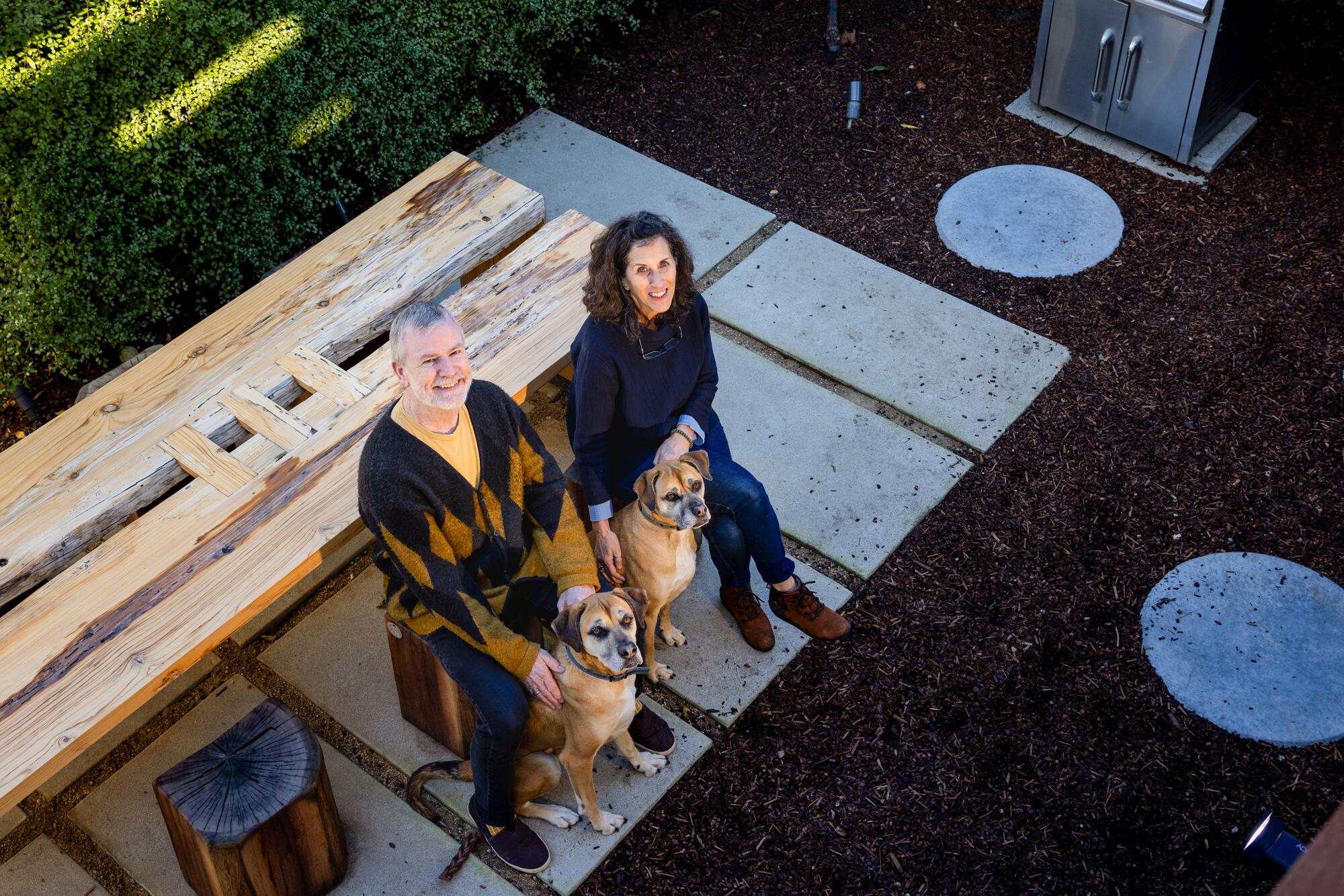
After 20 years, though, they believed they could finally pull it off.
“We had been working on the design for years,” Addison says. “When the zoning codes pertaining to our property began to transition, redefining allowable building area, we realized it was time to focus on the project before any code changes required us to redesign.”
Adds her husband: “As architects, our house was similar to the story of the cobbler’s children who have no shoes.”
A 380-square-foot ADU with plenty of storage offers flexibility for a Los Angeles couple and their extended family, including working from home and housing.
In 2019, they decided to take advantage of California’s revised residential codes and add an ADU above their detached garage for $200,000. After years spent considering the design, they had a plan: They would move into the ADU when it was complete and then oversee a second-story addition on the main house from a few feet away. As a bonus, they wouldn’t have to move off property during the house construction and pay exorbitant rent in L.A. In the spring of 2020, when the ADU was finished, they moved into it with their two boxers, George and Walter, for 14 months. By 2022, they moved back into the house and were ready to rent the ADU.
“I could open the door and look at the workers carrying the roof off our house,” Schierbeek says.
Measuring approximately 300 square feet, the ADU has enough space for a bed, sofa, kitchenette and desk for working from home. The architects placed the windows strategically to maintain privacy between the two homes and maximized the ceiling height to help open up the space.
“With our kids gone, it allowed us to purge,” Addison says of living in a tiny floor plan. “We learned that we didn’t need much.”
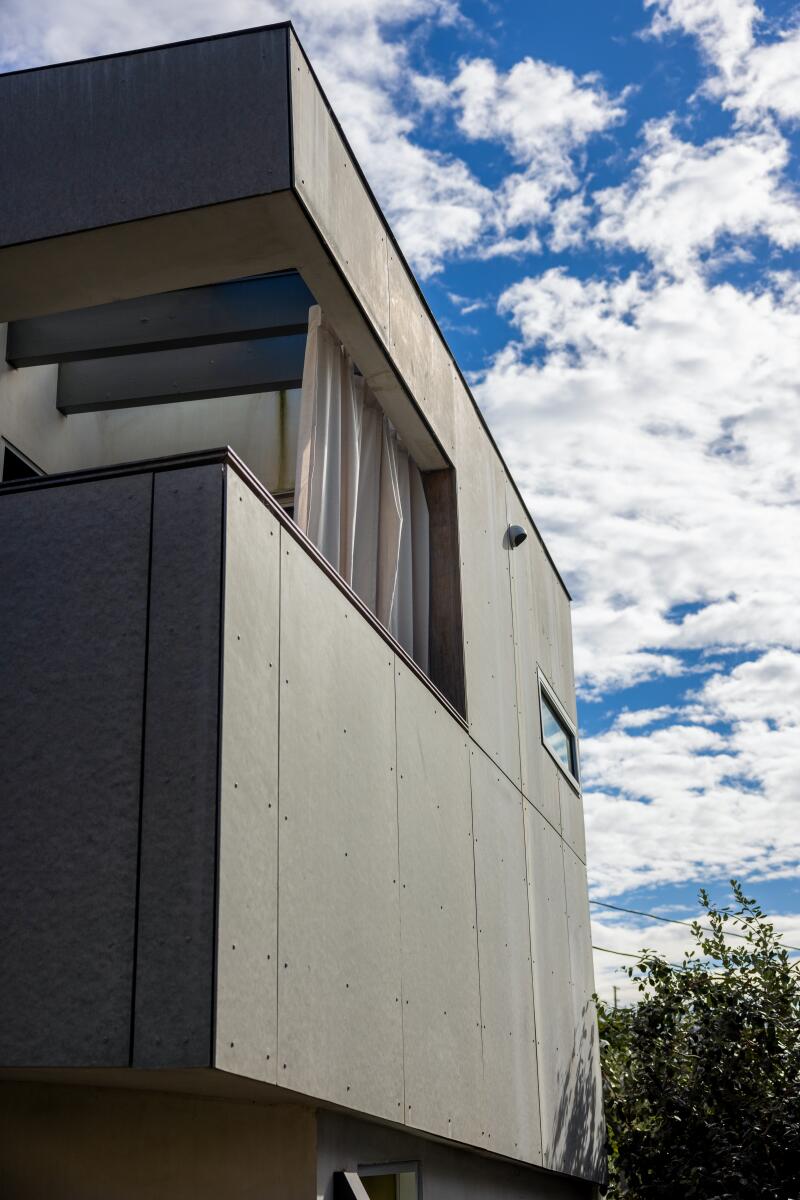
A curtain alongside a tiny patio was installed to provide privacy between the two homes.
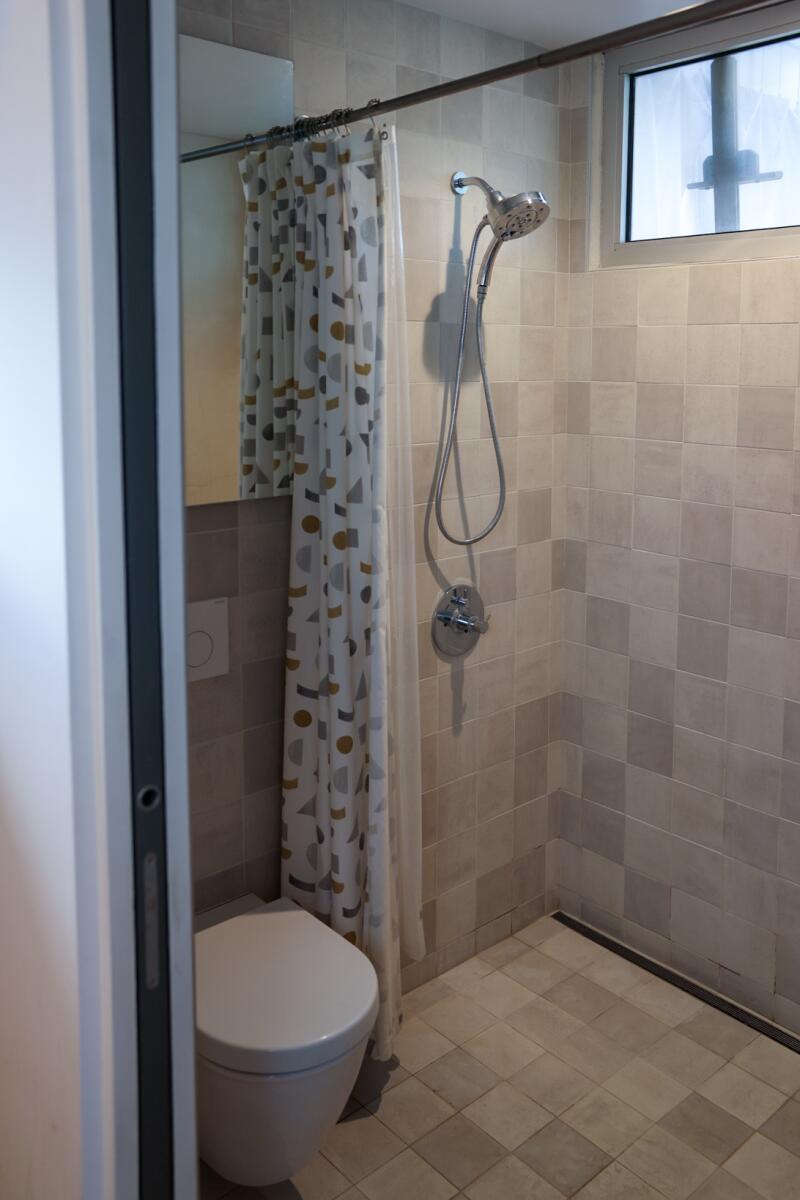
The bathroom is streamlined, similar to a wetroom.
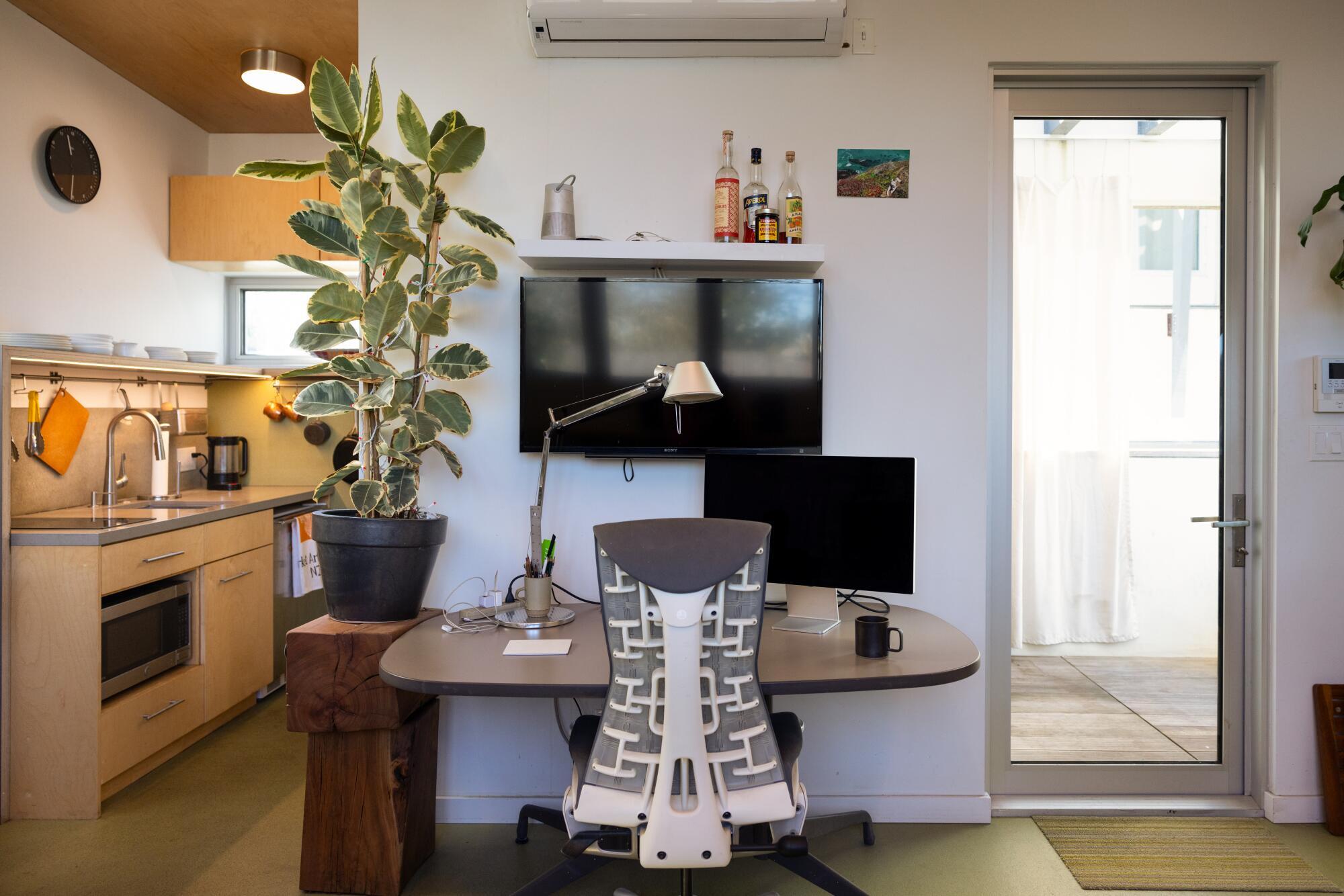
“It does require rethinking priorities,” adds Schierbeek, “but it does work. For instance, we didn’t build a closet; we used Ikea hanging racks instead. It was pretty austere, and it was quite easy.”
The interior space is bright thanks to multiple scattered windows and efficient use of space. There is only one sink in the unit, which means the kitchen faucet is used for everything from cooking to brushing teeth. According to Schierbeek, the loss of the sink gives the bathroom the streamlined feel of a wetroom you might find in India or Europe.
South-facing windows oriented to the sun allow the studio to stay warm in the winter and cool in the summer, and drapes outside the front door can be closed for further privacy if anyone wants to sit in the patio chair on the tiny stoop.
The second story’s exterior is clad in environmentally friendly fiber-cement boards and mirrors the contemporary shape of the street-facing house. With the two homes so closely connected, the architects felt it was important to design the ADU as a playful reflection of its neighbor.
On the alley, they added a separate entrance, which came in handy when renting the studio to Adam Mefford, a 43-year-old entrepreneur, in 2022. “He doesn’t have to walk through the property to get to his rental,” notes Addison. The couple currently rent the unit for a reduced fee of $1,750 a month, given that Mefford helps them with their two dogs, who move effortlessly between the two units. For context, the average rent for a 500-square-foot studio in Mar Vista is $2,449 a month, according to Apartments.com.

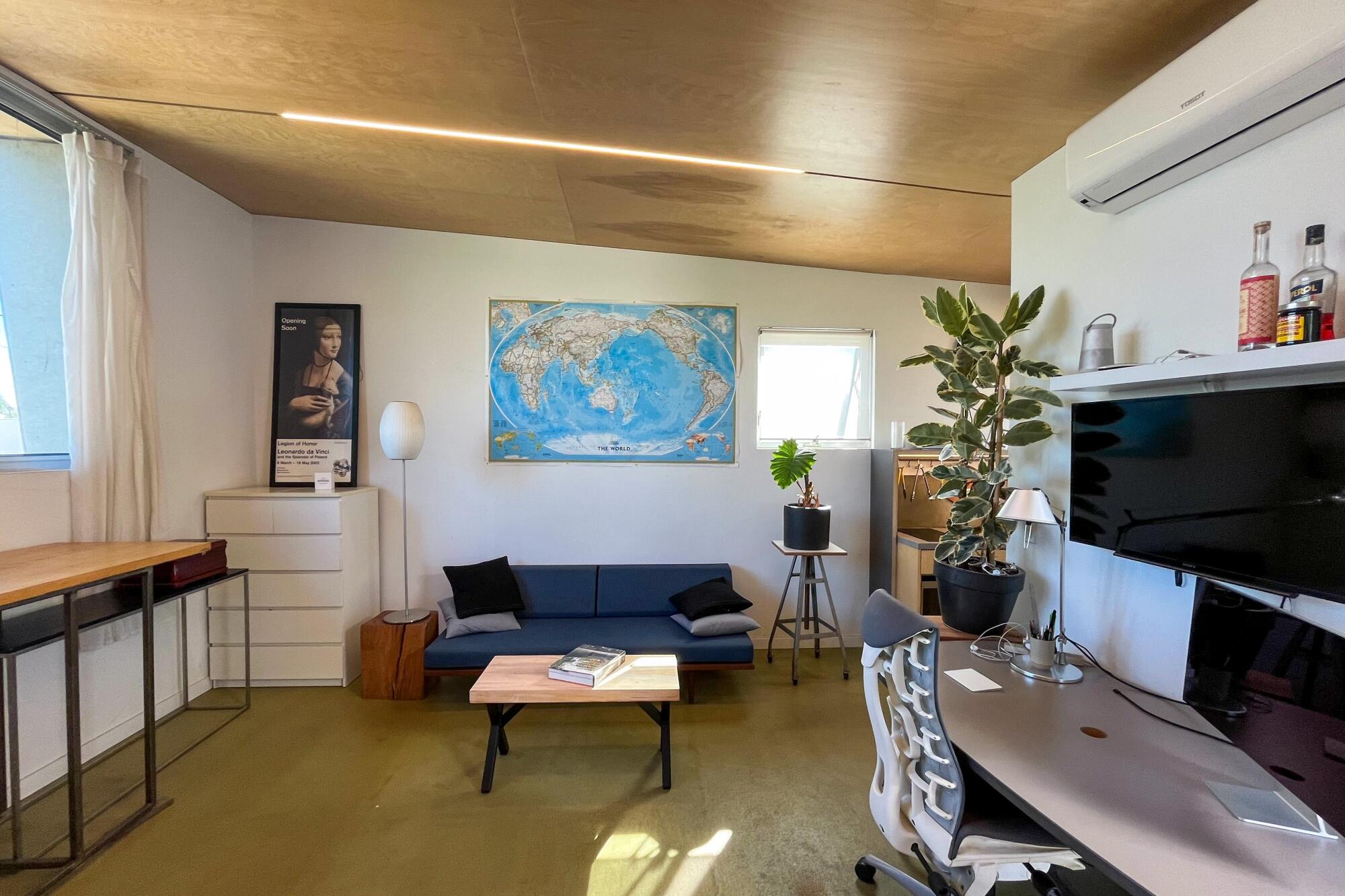
“Our tenant had to love dogs,” Addison laughs.
About that time, the couple joked that, like many adult children in California, their son returned home, and was disappointed to learn that Mefford had rented the ADU.
Nestled in between the two homes, a long picnic table and barbecue offer open-air dining as though it were a park.
Some days, the couple and Mefford enjoy eating together. Mefford uses the barbecue frequently because his rental only has a cooktop and mini-refrigerator. The couple emphasizes that he is welcome to host friends in their backyard anytime.
“We share it,” Schierbeek says. “If we plan on having people over, we let him know. He has dinner gatherings at the table on certain days. We have curtains and can close them if necessary. We are flexible.”
Neighbors have reason to be nervous about ADUs. Construction, new tenants and street parking can be inconvenient. Here’s how to smooth things over before you start construction.
The sense of community is not restricted to backyard barbecues. On New Year’s Day this year, the couple, who met at the University of Michigan, enjoyed watching the Wolverines beat the Crimson Tide in overtime on television along with their tenant.
“It adds to the living experience,” Schierbeek says of Mefford. “I don’t like the idea of putting up walls and fences. Socially, it feels better, and financially, it’s nice to have money come in as an investment.”
Before moving to Mar Vista, Mefford lived in a loft downtown. Now, he says he appreciates all that his new living arrangements have to offer, including visits from George and Walter.
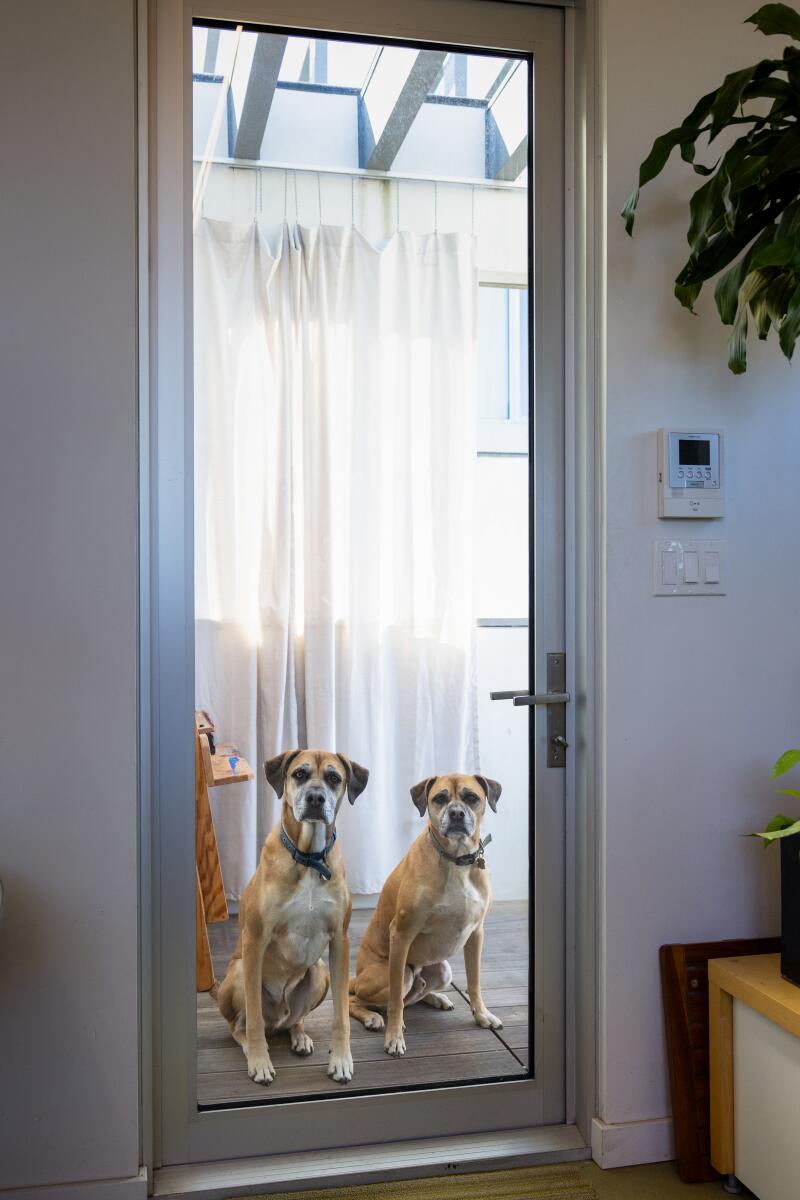
Walter, left, and George, right, wondering why they can’t come inside the ADU.
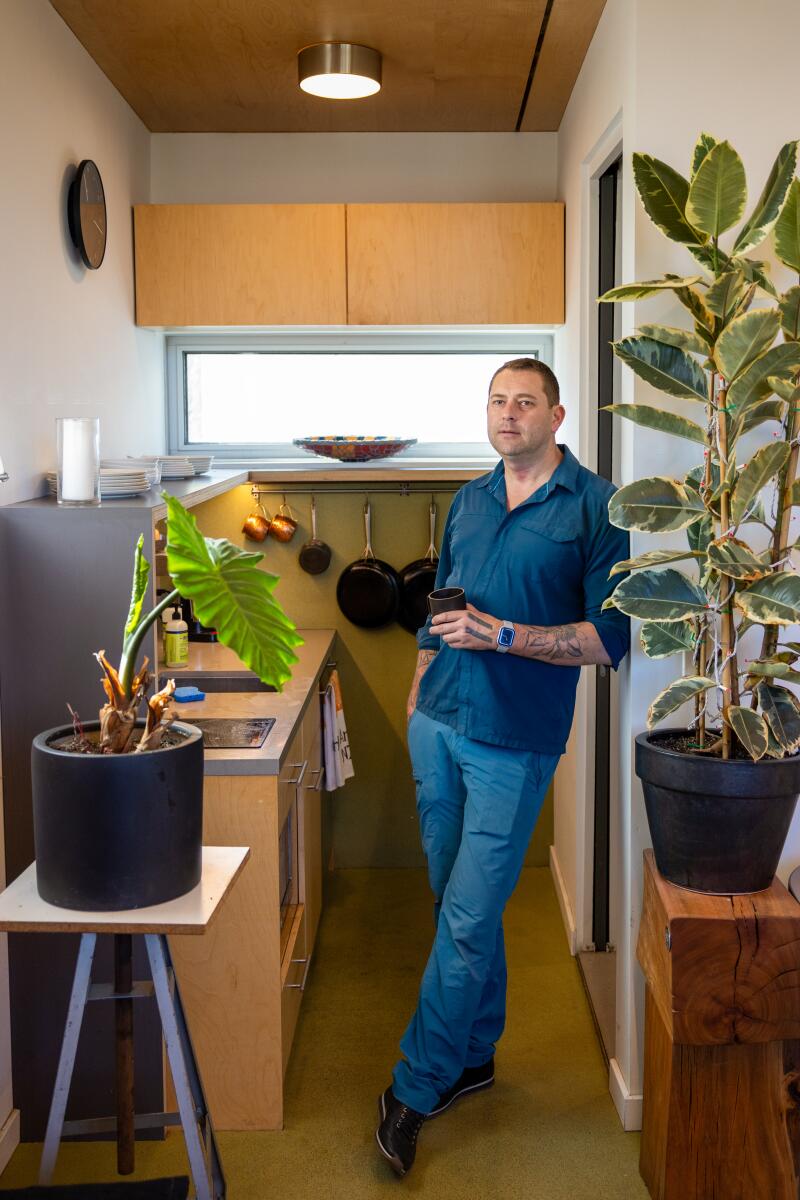
Adam Mefford stands inside his austere kitchen, next to the bathroom.
“The joys of living in the ADU include the great design, the light and the air movement, and the location within proximity of many stalwart SoCal attractions, such as biking to the Venice Canals, the Strand and the epic selection of connoisseur coffee outlets on this side of town,” Mefford said in an email.
The couple say they feel fortunate to have built the ADU before the COVID pandemic stalled construction and supply chain issues left builders without windows, doors and appliances. If the couple were to build a similar ADU today, they estimate it would cost significantly more. “We would have a hard time doing a second story for under $325,000 on the Westside now,” Schierbeek says.
It may have taken them 20 years to remodel their home, but the results were worth the wait: “We are living the experiment,” Schierbeek says of the second unit. “When you think about it, an ADU creates a community on your property. I’m glad we decided to rent it. That’s what ADUs are for — housing.”
More Los Angeles ADUs
Three rentals and an ADU? A narrow two-story in Venice makes the case for building up
They turned their tiny L.A. garage into an ADU rental for steady income. Here’s how
Millennials and Gen Z can’t afford homes. Is this prefab ADU a solution?
How a Spanish bungalow in L.A. went from sad to sexy (Hint: There’s an ADU rental)
She wanted more than a guesthouse for her sister. This tiny ADU in L.A. delivers
They built an ADU that’s ready for rules that don’t exist yet
Tetris-like ADU packs an office, pool house, music room and gym into a tiny space
Tiny hideaway inspired by Richard Neutra has terrarium vibes and a rooftop deck
This ADU rental with windows galore is a houseplant lover’s dream
How an aging Tudor’s ADU reunited a family and brought them closer together
They turned a one-car garage into a stunning ADU to house their parents.
SoCal small-space living: 37 homes that inspire
More to Read
Sign up for This Evening's Big Stories
Catch up on the day with the 7 biggest L.A. Times stories in your inbox every weekday evening.
You may occasionally receive promotional content from the Los Angeles Times.
